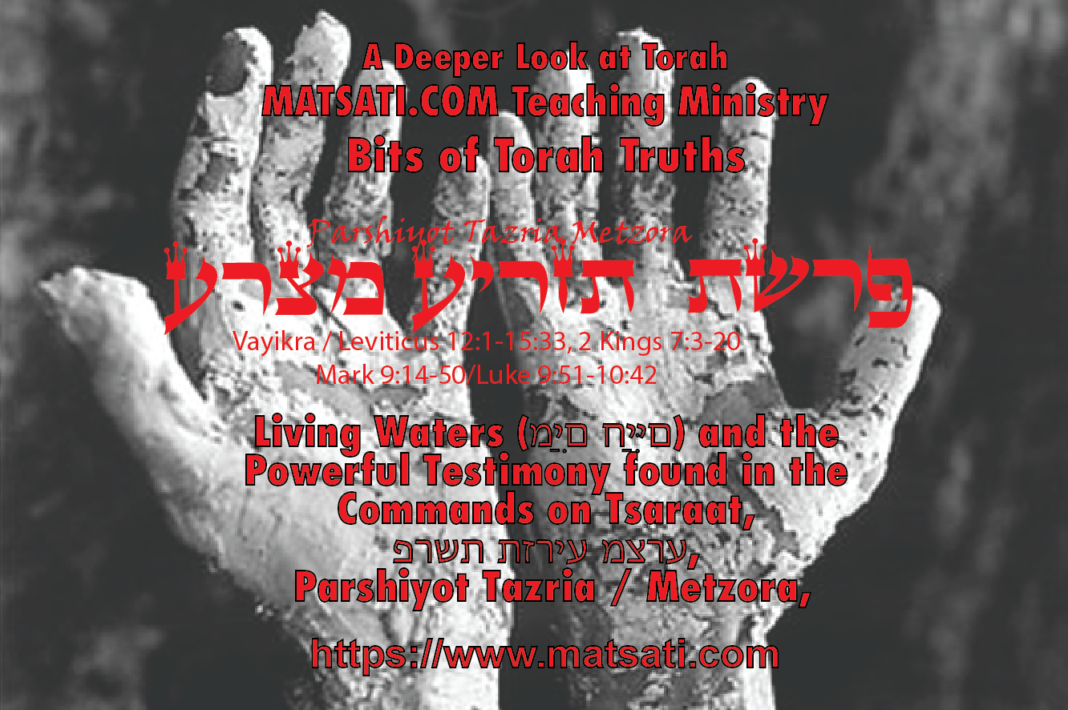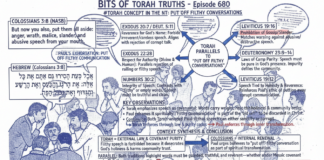In the Hebrew Bible, Tzaraat (צָרָ֑עַת) is a skin disease that can take many different forms, and in addition we are told that Tzaraat (צָרָ֑עַת) can also manifest itself on one’s clothing, belongings, and even in one’s house. According to the rabbis, Tzaraat (צָרָ֑עַת) is caused by sin. This makes it a disease like no others; part medical condition, part spiritual pathology. Because of this, Tzaraat (צָרָ֑עַת) has terrified humanity since ancient times. Within this awful disease, we also find a powerful message that reminds us of sin’s spread and horrible consequences. References to Tzaraat (צָרָ֑עַת) in the NT have an emphasis of God ’s mercy, grace, and desire to heal. This week’s double portion, Parashat Tazria/Metzora, speaks of the Torah commands on Tzaraat as we read according to Vayikra / Leviticus 13:1-3 which states the following, א וַיְדַבֵּ֣ר יְהוָ֔ה אֶל־מֹשֶׁ֥ה וְאֶֽל־אַהֲרֹ֖ן לֵאמֹֽר׃ ב אָדָ֗ם כִּֽי־יִהְיֶ֤ה בְעוֹר־בְּשָׂרוֹ֙ שְׂאֵ֤ת אֽוֹ־סַפַּ֙חַת֙ א֣וֹ בַהֶ֔רֶת וְהָיָ֥ה בְעוֹר־בְּשָׂר֖וֹ לְנֶ֣גַע צָרָ֑עַת וְהוּבָא֙ אֶל־אַהֲרֹ֣ן הַכֹּהֵ֔ן א֛וֹ אֶל־אַחַ֥ד מִבָּנָ֖יו הַכֹּהֲנִֽים׃ ג וְרָאָ֣ה הַכֹּהֵ֣ן אֶת־הַנֶּ֣גַע בְּעֽוֹר־הַ֠בָּשָׂר וְשֵׂעָ֨ר בַּנֶּ֜גַע הָפַ֣ךְ׀ לָבָ֗ן וּמַרְאֵ֤ה הַנֶּ֙גַע֙ עָמֹק֙ מֵע֣וֹר בְּשָׂר֔וֹ נֶ֥גַע צָרַ֖עַת ה֑וּא וְרָאָ֥הוּ הַכֹּהֵ֖ן וְטִמֵּ֥א אֹתֽוֹ׃ 13:1 Then the Lord spoke to Moses and to Aaron, saying, 13:2 “When someone has on the skin of his body a swelling, or a scab, or a bright spot, and it becomes an infection of leprosy on the skin of his body, then he shall be brought to Aaron the priest or to one of his sons the priests. 13:3 The priest shall look at the infected area on the skin of the body, and if the hair in the infection has turned white and the infection appears to be deeper than the skin of his body, it is an infection of leprosy; when the priest has looked at him, he shall pronounce him unclean. (NASB) Here in these few verses we are told how the priest is to inspect the skin and determine whether the spot is Tzaraat or not.
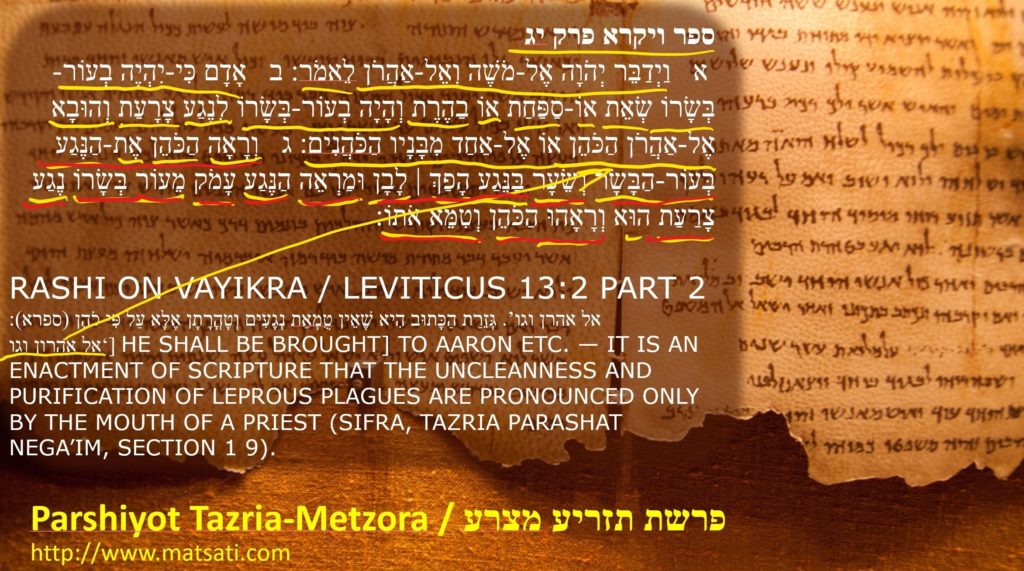
Rashi makes the following conclusion on Vayikra / Leviticus 13:2.
Rashi on Vayikra / Leviticus 13:2 Part 2
אל אהרן וגו’. גְּזֵרַת הַכָּתוּב הִיא שֶׁאֵין טֻמְאַת נְגָעִים וְטָהֳרָתָן אֶלָּא עַל פִּי כֹהֵן (ספרא):
‘אל אהרון וגו [HE SHALL BE BROUGHT] TO AARON etc. — It is an enactment of Scripture that the uncleanness and purification of leprous plagues are pronounced only by the mouth of a priest (Sifra, Tazria Parashat Nega’im, Section 1 9).
The significant part about this command that Rashi is pointing out is how the Tzaraat determines whether one is clean or unclean, and it is the priest who is the only one qualified to inspect, determine, and pronounce whether one is pure or impure. We note here something the text states specifically, ג וְרָאָ֣ה הַכֹּהֵ֣ן אֶת־הַנֶּ֣גַע בְּעֽוֹר־הַ֠בָּשָׂר וְשֵׂעָ֨ר בַּנֶּ֜גַע הָפַ֣ךְ׀ לָבָ֗ן וּמַרְאֵ֤ה הַנֶּ֙גַע֙ עָמֹק֙ מֵע֣וֹר בְּשָׂר֔וֹ נֶ֥גַע צָרַ֖עַת ה֑וּא וְרָאָ֥הוּ הַכֹּהֵ֖ן וְטִמֵּ֥א אֹתֽוֹ׃ 13:3 The priest shall look at the infected area on the skin of the body, and if the hair in the infection has turned white and the infection appears to be deeper than the skin of his body, it is an infection of leprosy; when the priest has looked at him, he shall pronounce him unclean. (NASB) The description here sounds like there is a spot that may appear on a persons arm which is superficial, and then there is one that goes much deeper. The type that is deeper is the one that is ruled to be Tzaraat. It should also be pointed out that while Tzaraat (צָרָ֑עַת) is generally translated as “leprosy” in the English translations, this disease represents a physical disarray in the body of the person. In Jewish tradition it also carries with it a moral and spiritual meaning as illumined further on by Ramban according to Vayikra / Leviticus 13:47. In addition to this, note how Tzaraat (צָרָ֑עַת) is of a very intimate nature, as one is able to hide this disease from others. Therefore it is the duty of a person to inform the priest of their illness. The rabbis say this is not an illness that has come by chance. (Sefer HaChinukh 169.1) The bringing of the one who has Tzaraat (צָרָ֑עַת) to the priest is analogous to determining the greatness of one’s iniquity which caused it. Because of these things the rabbis have classically interpreted this to be an affliction from God. With the declaration of being impure due to Tzaraat, one is told to live outside of the community. This has the implication of effecting our relationship with both God and man. In the Septuagint, the Greek translation of the Hebrew Bible, Tzaraat (צָרָ֑עַת) was translated as aphe lepras. These words in Greek implied a skin condition that spread over the body. Though we do not know all of the reasons why God allows this disease, biblical Tzaraat (צָרָ֑עַת) is a powerful symbol reminding us of sin’s spread and its horrible consequences in our lives. Like Tzaraat (צָרָ֑עַת), sin starts out small but can then spread, leading to other sins and causing great damage to our relationship with God and others.
This week we are looking at the Scriptures from Vayikra / Leviticus 13:1-17.
ספר ויקרא פרק יג
א וַיְדַבֵּ֣ר יְהוָ֔ה אֶל־מֹשֶׁ֥ה וְאֶֽל־אַהֲרֹ֖ן לֵאמֹֽר׃ ב אָדָ֗ם כִּֽי־יִהְיֶ֤ה בְעוֹר־בְּשָׂרוֹ֙ שְׂאֵ֤ת אֽוֹ־סַפַּ֙חַת֙ א֣וֹ בַהֶ֔רֶת וְהָיָ֥ה בְעוֹר־בְּשָׂר֖וֹ לְנֶ֣גַע צָרָ֑עַת וְהוּבָא֙ אֶל־אַהֲרֹ֣ן הַכֹּהֵ֔ן א֛וֹ אֶל־אַחַ֥ד מִבָּנָ֖יו הַכֹּהֲנִֽים׃ ג וְרָאָ֣ה הַכֹּהֵ֣ן אֶת־הַנֶּ֣גַע בְּעֽוֹר־הַ֠בָּשָׂר וְשֵׂעָ֨ר בַּנֶּ֜גַע הָפַ֣ךְ׀ לָבָ֗ן וּמַרְאֵ֤ה הַנֶּ֙גַע֙ עָמֹק֙ מֵע֣וֹר בְּשָׂר֔וֹ נֶ֥גַע צָרַ֖עַת ה֑וּא וְרָאָ֥הוּ הַכֹּהֵ֖ן וְטִמֵּ֥א אֹתֽוֹ׃ ד וְאִם־בַּהֶרֶת֩ לְבָנָ֨ה הִ֜וא בְּע֣וֹר בְּשָׂר֗וֹ וְעָמֹק֙ אֵין־מַרְאֶ֣הָ מִן־הָע֔וֹר וּשְׂעָרָ֖ה לֹא־הָפַ֣ךְ לָבָ֑ן וְהִסְגִּ֧יר הַכֹּהֵ֛ן אֶת־הַנֶּ֖גַע שִׁבְעַ֥ת יָמִֽים׃ ה וְרָאָ֣הוּ הַכֹּהֵן֮ בַּיּ֣וֹם הַשְּׁבִיעִי֒ וְהִנֵּ֤ה הַנֶּ֙גַע֙ עָמַ֣ד בְּעֵינָ֔יו לֹֽא־פָשָׂ֥ה הַנֶּ֖גַע בָּע֑וֹר וְהִסְגִּיר֧וֹ הַכֹּהֵ֛ן שִׁבְעַ֥ת יָמִ֖ים שֵׁנִֽית׃ ו וְרָאָה֩ הַכֹּהֵ֨ן אֹת֜וֹ בַּיּ֣וֹם הַשְּׁבִיעִי֮ שֵׁנִית֒ וְהִנֵּה֙ כֵּהָ֣ה הַנֶּ֔גַע וְלֹא־פָשָׂ֥ה הַנֶּ֖גַע בָּע֑וֹר וְטִהֲר֤וֹ הַכֹּהֵן֙ מִסְפַּ֣חַת הִ֔יא וְכִבֶּ֥ס בְּגָדָ֖יו וְטָהֵֽר׃ ז וְאִם־פָּשֹׂ֨ה תִפְשֶׂ֤ה הַמִּסְפַּ֙חַת֙ בָּע֔וֹר אַחֲרֵ֧י הֵרָאֹת֛וֹ אֶל־הַכֹּהֵ֖ן לְטָהֳרָת֑וֹ וְנִרְאָ֥ה שֵׁנִ֖ית אֶל־הַכֹּהֵֽן׃ ח וְרָאָה֙ הַכֹּהֵ֔ן וְהִנֵּ֛ה פָּשְׂתָ֥ה הַמִּסְפַּ֖חַת בָּע֑וֹר וְטִמְּא֥וֹ הַכֹּהֵ֖ן צָרַ֥עַת הִֽוא׃ פ ט נֶ֣גַע צָרַ֔עַת כִּ֥י תִהְיֶ֖ה בְּאָדָ֑ם וְהוּבָ֖א אֶל־הַכֹּהֵֽן׃ י וְרָאָ֣ה הַכֹּהֵ֗ן וְהִנֵּ֤ה שְׂאֵת־לְבָנָה֙ בָּע֔וֹר וְהִ֕יא הָפְכָ֖ה שֵׂעָ֣ר לָבָ֑ן וּמִֽחְיַ֛ת בָּשָׂ֥ר חַ֖י בַּשְׂאֵֽת׃ יא צָרַ֨עַת נוֹשֶׁ֤נֶת הִוא֙ בְּע֣וֹר בְּשָׂר֔וֹ וְטִמְּא֖וֹ הַכֹּהֵ֑ן לֹ֣א יַסְגִּרֶ֔נּוּ כִּ֥י טָמֵ֖א הֽוּא׃ יב וְאִם־פָּר֨וֹחַ תִּפְרַ֤ח הַצָּרַ֙עַת֙ בָּע֔וֹר וְכִסְּתָ֣ה הַצָּרַ֗עַת אֵ֚ת כָּל־ע֣וֹר הַנֶּ֔גַע מֵרֹאשׁ֖וֹ וְעַד־רַגְלָ֑יו לְכָל־מַרְאֵ֖ה עֵינֵ֥י הַכֹּהֵֽן׃ יג וְרָאָ֣ה הַכֹּהֵ֗ן וְהִנֵּ֨ה כִסְּתָ֤ה הַצָּרַ֙עַת֙ אֶת־כָּל־בְּשָׂר֔וֹ וְטִהַ֖ר אֶת־הַנָּ֑גַע כֻּלּ֛וֹ הָפַ֥ךְ לָבָ֖ן טָה֥וֹר הֽוּא׃ יד וּבְי֨וֹם הֵרָא֥וֹת בּ֛וֹ בָּשָׂ֥ר חַ֖י יִטְמָֽא׃ טו וְרָאָ֧ה הַכֹּהֵ֛ן אֶת־הַבָּשָׂ֥ר הַחַ֖י וְטִמְּא֑וֹ הַבָּשָׂ֥ר הַחַ֛י טָמֵ֥א ה֖וּא צָרַ֥עַת הֽוּא׃ טז א֣וֹ כִ֥י יָשׁ֛וּב הַבָּשָׂ֥ר הַחַ֖י וְנֶהְפַּ֣ךְ לְלָבָ֑ן וּבָ֖א אֶל־הַכֹּהֵֽן׃ יז וְרָאָ֙הוּ֙ הַכֹּהֵ֔ן וְהִנֵּ֛ה נֶהְפַּ֥ךְ הַנֶּ֖גַע לְלָבָ֑ן וְטִהַ֧ר הַכֹּהֵ֛ן אֶת־הַנֶּ֖גַע טָה֥וֹר הֽוּא׃ פ
Vayikra / Leviticus 13:1-17
13:1 Then the Lord spoke to Moses and to Aaron, saying, 13:2 “When someone has on the skin of his body a swelling, or a scab, or a bright spot, and it becomes an infection of leprosy on the skin of his body, then he shall be brought to Aaron the priest or to one of his sons the priests. 13:3 The priest shall look at the infected area on the skin of the body, and if the hair in the infection has turned white and the infection appears to be deeper than the skin of his body, it is an infection of leprosy; when the priest has looked at him, he shall pronounce him unclean. 13:4 But if the bright spot is white on the skin of his body, and it does not appear to be deeper than the skin, and the hair on it has not turned white, then the priest shall isolate the person who has the infection for seven days. 13:5 Then the priest shall look at him on the seventh day, and if in his eyes the infection has not changed and the infection has not spread on the skin, then the priest shall isolate him for seven more days. 13:6 The priest shall then look at him again on the seventh day, and if the infected area has faded and the infection has not spread on the skin, then the priest shall pronounce him clean; it is only a rash. And he shall wash his clothes and be clean. 13:7 “But if the rash spreads farther on the skin after he has shown himself to the priest for his cleansing, he shall appear again to the priest. 13:8 And the priest shall look, and if the rash has spread on the skin, then the priest shall pronounce him unclean; it is leprosy. 13:9 “When the infection of leprosy is on someone, then he shall be brought to the priest. 13:10 The priest shall then look, and if there is a white swelling on the skin, and it has turned the hair white, and there is new raw flesh in the swelling, 13:11 it is a chronic leprosy on the skin of his body, and the priest shall pronounce him unclean; he shall not isolate him, for he is unclean. 13:12 If the leprosy breaks out farther on the skin, and the leprosy covers all the skin of the person who has the infection from his head even to his feet, as far as the priest can see, 13:13 then the priest shall look, and behold, if the leprosy has covered his entire body, he shall pronounce the one who has the infection clean; it has all turned white and he is clean. 13:14 But whenever raw flesh appears on him, he shall be unclean. 13:15 The priest shall look at the raw flesh, and he shall pronounce him unclean; the raw flesh is unclean, it is leprosy. 13:16 Or if the raw flesh turns back and is changed to white, then he shall come to the priest, 13:17 and the priest shall look at him, and behold, if the infected area has turned white, then the priest shall pronounce the one who has the infection clean; he is clean. (NASB)
As we had discussed, we do not always know why God allows disease in our lives. This concept of Tzaraat (צָרָ֑עַת) is a powerful reason we should not allow sin to run rampant in our lives. Like Tzaraat (צָרָ֑עַת), sin starts out small but can then spread, leading to other sins and causing great damage to our relationship with God and others. When we get to the Apostolic Writings, we find an emphasis of how much God loves us, and this love even extends to those who are afflicted by Tzaraat (צָרָ֑עַת). Note the classical Jewish interpretation here as one’s sins have become manifest in one’s body, thus making a leper a sinner above all sinners. This reminds us how the Love of God also extends to the worst of sinners. When those who are stricken with this disease, they suffer banishment from family, friends, and from the presence of God at the sanctuary. When Yeshua met one who was stricken with Tzaraat (צָרָ֑עַת), he stressed God’s desire to heal and so breaking with tradition, he touched the one who was afflicted, having compassion, and healing them! The following are a few references where Yeshua healed lepers according to Matthew 8:1-3, 10:5-8, 11:2-6, and Luke 17:12-18.
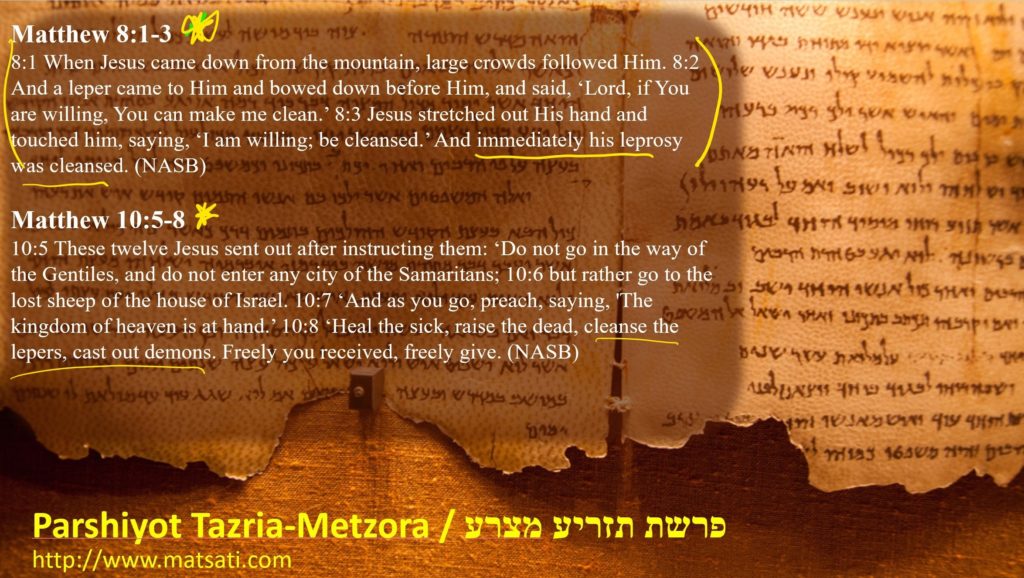
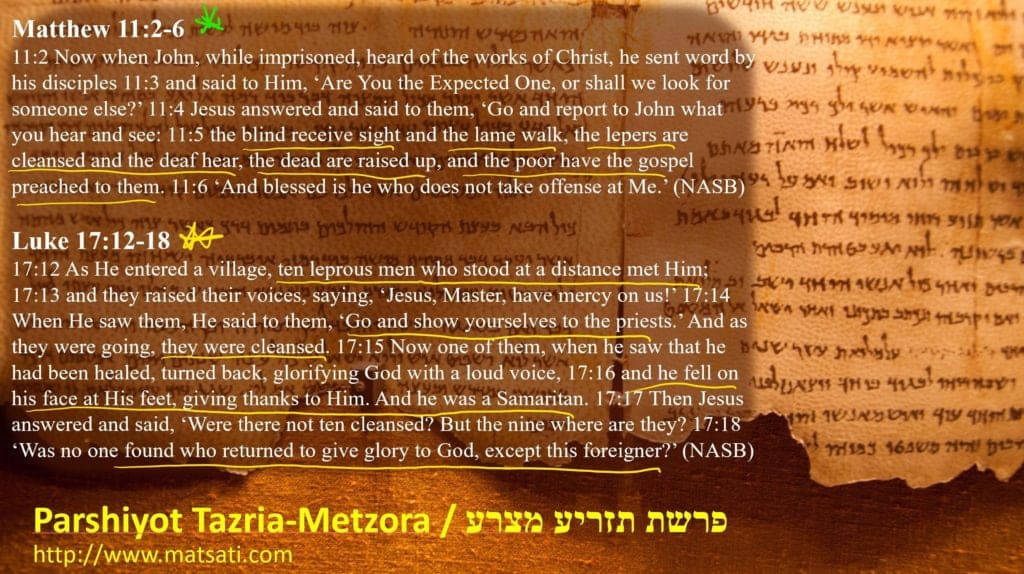
Matthew 8:1-3
8:1 When Jesus came down from the mountain, large crowds followed Him. 8:2 And a leper came to Him and bowed down before Him, and said, ‘Lord, if You are willing, You can make me clean.’ 8:3 Jesus stretched out His hand and touched him, saying, “I am willing; be cleansed.” And immediately his leprosy was cleansed. (NASB)
Matthew 10:5-8
10:5 These twelve Jesus sent out after instructing them: ‘Do not go in the way of the Gentiles, and do not enter any city of the Samaritans; 10:6 but rather go to the lost sheep of the house of Israel. 10:7 ‘And as you go, preach, saying, ‘The kingdom of heaven is at hand.’ 10:8 ‘Heal the sick, raise the dead, cleanse the lepers, cast out demons. Freely you received, freely give. (NASB)
Matthew 11:2-6
11:2 Now when John, while imprisoned, heard of the works of Christ, he sent word by his disciples 11:3 and sai6d to Him, ‘Are You the Expected One, or shall we look for someone else?’ 11:4 Jesus answered and said to them, ‘Go and report to John what you hear and see: 11:5 the blind receive sight and the lame walk, the lepers are cleansed and the deaf hear, the dead are raised up, and the poor have the gospel preached to them. 11:6 ‘And blessed is he who does not take offense at Me.’ (NASB)
Luke 17:12-18
17:12 As He entered a village, ten leprous men who stood at a distance met Him; 17:13 and they raised their voices, saying, ‘Jesus, Master, have mercy on us!’ 17:14 When He saw them, He said to them, ‘Go and show yourselves to the priests.’ And as they were going, they were cleansed. 17:15 Now one of them, when he saw that he had been healed, turned back, glorifying God with a loud voice, 17:16 and he fell on his face at His feet, giving thanks to Him. And he was a Samaritan. 17:17 Then Jesus answered and said, ‘Were there not ten cleansed? But the nine where are they? 17:18 ‘Was no one found who returned to give glory to God, except this foreigner?’ 17:19 And He said to him, ‘Stand up and go; your faith has made you well.’ (NASB)
We read here various instances when Yeshua cleansed the leper in the NT. When Yeshua did so, he instructed the person who was healed to not tell anyone but go and show yourself to the priest and offer the prescribed sacrifices that God had commanded at the hand of Moshe. Now there is something to note about the Torah commands. We note how the priests did not have the ability to cleanse the one who was afflicted with Tzaraat (צָרָ֑עַת). The priest could only diagnose and determine whether one was clean or unclean. If the priest found the man to be clean, then there were sacrifices that Moshe prescribed to be performed following having made that determination. The sacrifices that were prescribed are given in Vayikra / Leviticus 14.
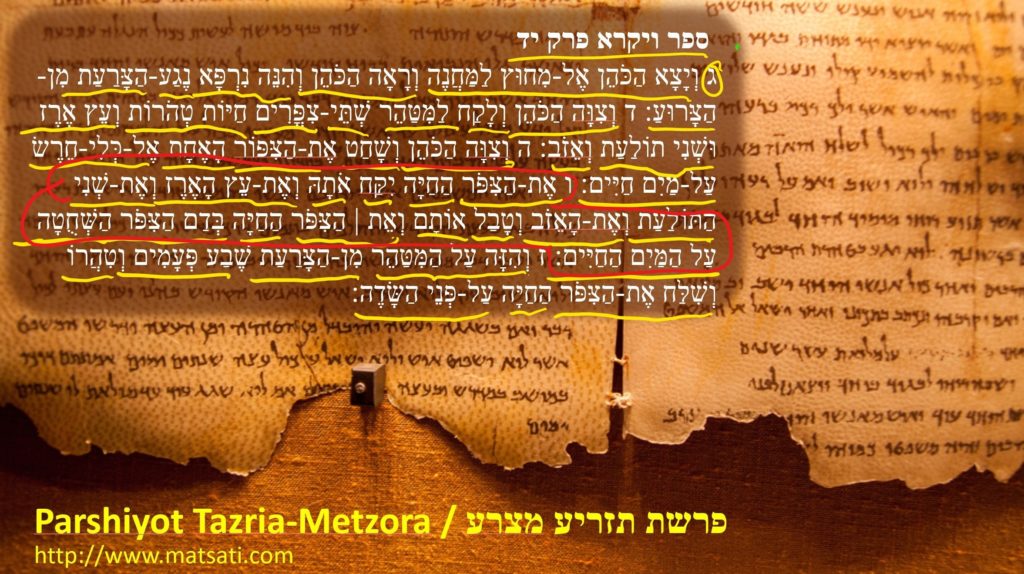
ספר ויקרא פרק יד
ג וְיָצָא הַכֹּהֵן אֶל-מִחוּץ לַמַּחֲנֶה וְרָאָה הַכֹּהֵן וְהִנֵּה נִרְפָּא נֶגַע-הַצָּרַעַת מִן-הַצָּרוּעַ: ד וְצִוָּה הַכֹּהֵן וְלָקַח לַמִּטַּהֵר שְׁתֵּי-צִפֳּרִים חַיּוֹת טְהֹרוֹת וְעֵץ אֶרֶז וּשְׁנִי תוֹלַעַת וְאֵזֹב: ה וְצִוָּה הַכֹּהֵן וְשָׁחַט אֶת-הַצִּפּוֹר הָאֶחָת אֶל-כְּלִי-חֶרֶשֹ עַל-מַיִם חַיִּים: ו אֶת-הַצִּפֹּר הַחַיָּה יִקַּח אֹתָהּ וְאֶת-עֵץ הָאֶרֶז וְאֶת-שְׁנִי הַתּוֹלַעַת וְאֶת-הָאֵזֹב וְטָבַל אוֹתָם וְאֵת | הַצִּפֹּר הַחַיָּה בְּדַם הַצִּפֹּר הַשְּׁחֻטָה עַל הַמַּיִם הַחַיִּים: ז וְהִזָּה עַל הַמִּטַּהֵר מִן-הַצָּרַעַת שֶׁבַע פְּעָמִים וְטִהֲרוֹ וְשִׁלַּח אֶת-הַצִּפֹּר הַחַיָּה עַל-פְּנֵי הַשָּׂדֶה:
Vayikra / Leviticus 14:3-7
14:3 and the priest shall go out to the outside of the camp. Thus the priest shall look, and if the infection of leprosy has been healed in the leper, 14:4 then the priest shall give orders to take two live clean birds and cedar wood and a scarlet string and hyssop for the one who is to be cleansed. 14:5 ‘The priest shall also give orders to slay the one bird in an earthenware vessel over running water. 14:6 ‘As for the live bird, he shall take it together with the cedar wood and the scarlet string and the hyssop, and shall dip them and the live bird in the blood of the bird that was slain over the running water. 14:7 ‘He shall then sprinkle seven times the one who is to be cleansed from the leprosy and shall pronounce him clean, and shall let the live bird go free over the open field. (NASB)
When the priest would inspect the man who had the skin disease, he would unwittingly confirm the power of God in Yeshua to cleans the one who was stricken. The interesting aspect of this is as one was cleansed, he also had his sins forgiven him. The reason being as the connection of sin to having caused one to be stricken with Tzaraat. By the priest declaring him clean, he was providing expert witness to the authenticity of the miracle. Therefore when Yeshua told the one who was cleansed to do as the Torah had commanded through the priest at the Temple, the Torah command was bearing witness of who Yeshua was as being sent of God! An interesting observation is made when we study the Hebrew Scriptures, we pay particular attention to Vayikra / Leviticus 14:6, ו אֶת-הַצִּפֹּר הַחַיָּה יִקַּח אֹתָהּ וְאֶת-עֵץ הָאֶרֶז וְאֶת-שְׁנִי הַתּוֹלַעַת וְאֶת-הָאֵזֹב וְטָבַל אוֹתָם וְאֵת | הַצִּפֹּר הַחַיָּה בְּדַם הַצִּפֹּר הַשְּׁחֻטָה עַל הַמַּיִם הַחַיִּים: 14:6 ‘As for the live bird, he shall take it together with the cedar wood and the scarlet string and the hyssop, and shall dip them and the live bird in the blood of the bird that was slain over the running water. (NASB) Here we find one bird was slaughtered, and one remained alive. This provides us with a picture of the one who born one’s sins and died, and the one who lives as a living sacrifice. In addition to this, we read how the bird is to be slaughtered over הַמַּיִם הַחַיִּים: (living waters). This is a significant point based on what we read Yeshua saying of himself in John 4.
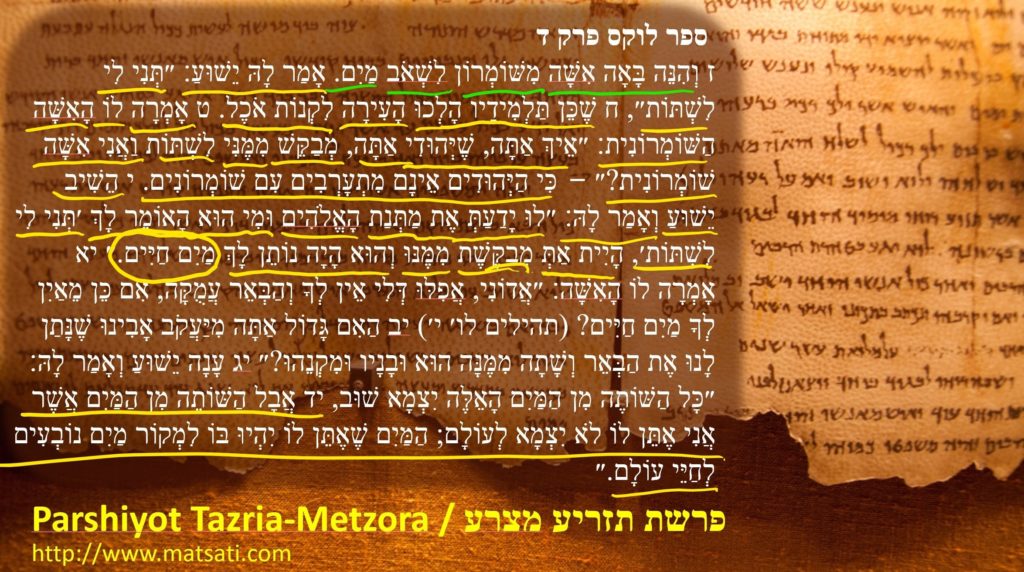
ספר לוקס פרק ד
ז וְהִנֵּה בָּאָה אִשָּׁה מִשּׁוֹמְרוֹן לִשְׁאֹב מַיִם. אָמַר לָהּ יֵשׁוּעַ׃ ״תְּנִי לִי לִשְׁתּוֹת״, ח שֶׁכֵּן תַּלְמִידָיו הָלְכוּ הָעִירָה לִקְנוֹת אֹכֶל. ט אָמְרָה לוֹ הָאִשָּׁה הַשּׁוֹמְרוֹנִית׃ ״אֵיךְ אַתָּה, שֶׁיְּהוּדִי אַתָּה, מְבַקֵּשׁ מִמֶּנִּי לִשְׁתּוֹת וַאֲנִי אִשָּׁה שׁוֹמְרוֹנִית?״ – כִּי הַיְּהוּדִים אֵינָם מִתְעָרְבִים עִם שׁוֹמְרוֹנִים. י הֵשִׁיב יֵשׁוּעַ וְאָמַר לָהּ׃ ״לוּ יָדַעַתְּ אֶת מַתְּנַת הָאֱלֹהִים וּמִי הוּא הָאוֹמֵר לָךְ ׳תְּנִי לִי לִשְׁתּוֹת׳, הָיִית אַתְּ מְבַקֶּשֶׁת מִמֶּנּוּ וְהוּא הָיָה נוֹתֵן לָךְ מַיִם חַיִּים.״ יא אָמְרָה לוֹ הָאִשָּׁה׃ ״אֲדוֹנִי, אֲפִלּוּ דְּלִי אֵין לְךָ וְהַבְּאֵר עֲמֻקָּה, אִם כֵּן מֵאַיִן לְךָ מַיִם חַיִּים? (תהילים לו׳ י׳) יב הַאִם גָּדוֹל אַתָּה מִיַּעֲקֹב אָבִינוּ שֶׁנָּתַן לָנוּ אֶת הַבְּאֵר וְשָׁתָה מִמֶּנָּה הוּא וּבָנָיו וּמִקְנֵהוּ?״ יג עָנָה יֵשׁוּעַ וְאָמַר לָהּ׃ ״כָּל הַשּׁוֹתֶה מִן הַמַּיִם הָאֵלֶּה יִצְמָא שׁוּב, יד אֲבָל הַשּׁוֹתֶה מִן הַמַּיִם אֲשֶׁר אֲנִי אֶתֵּן לוֹ לֹא יִצְמָא לְעוֹלָם; הַמַּיִם שֶׁאֶתֵּן לוֹ יִהְיוּ בּוֹ לִמְקוֹר מַיִם נוֹבְעִים לְחַיֵּי עוֹלָם.״
John 4:7-14
4:7 There came a woman of Samaria to draw water. Jesus said to her, ‘Give Me a drink.’ 4:8 For His disciples had gone away into the city to buy food. 4:9 Therefore the Samaritan woman said to Him, ‘How is it that You, being a Jew, ask me for a drink since I am a Samaritan woman?’ (For Jews have no dealings with Samaritans.) 4:10 Jesus answered and said to her, ‘If you knew the gift of God, and who it is who says to you, ‘Give Me a drink,’ you would have asked Him, and He would have given you living water.’ 4:11 She said to Him, ‘Sir, You have nothing to draw with and the well is deep; where then do You get that living water? 4:12 ‘You are not greater than our father Jacob, are You, who gave us the well, and drank of it himself and his sons and his cattle?’ 4:13 Jesus answered and said to her, ‘Everyone who drinks of this water will thirst again; 4:14 but whoever drinks of the water that I will give him shall never thirst; but the water that I will give him will become in him a well of water springing up to eternal life.’ (NASB)
What is quite remarkable is what Yeshua says according to John 4:10, י הֵשִׁיב יֵשׁוּעַ וְאָמַר לָהּ׃ ״לוּ יָדַעַתְּ אֶת מַתְּנַת הָאֱלֹהִים וּמִי הוּא הָאוֹמֵר לָךְ ׳תְּנִי לִי לִשְׁתּוֹת׳, הָיִית אַתְּ מְבַקֶּשֶׁת מִמֶּנּוּ וְהוּא הָיָה נוֹתֵן לָךְ מַיִם חַיִּים.״ 4:10 Jesus answered and said to her, ‘If you knew the gift of God, and who it is who says to you, ‘Give Me a drink,’ you would have asked Him, and He would have given you living water.’ (NASB) Yeshua speaks of the giving of living waters inside of a person. This parallels the cleansing ritual over living waters. Yeshua instructing one who was cleansed to go to the Temple and to perform the sacrifices was a testimony to the power of God to heal. The interesting rabbinic insight from the living waters is this represents one having a true knowledge of God. This is associated with the Holy Spirit of God, coupled to these things we read here on the cleansing from impurity, the healing of the body, and the forgiveness of sins, the healing of Tzaraat is a powerful testimony of the power of God in one’s life. These things speak of truth and life proceeding from God in Jerusalem. The antithesis of this the dead sea where there is death, dead waters, false knowledge of God, false prophets, twisted doctrines, lies, and sin. Remember how the Hebrew word דעת (daat) describes one as having an intimate knowledge when we know a person and care for them. These living waters (מַיִם חַיִּים) that proceeds from God and His Holy Spirit through the Messiah is a picture of God dwelling in our midst and cleansing us from the inside out! Remember what God had spoken through the prophet Ezekiel in Ezekiel 47 as Ezekiel saw living waters (מַיִם חַיִּים) proceed from God in the Temple. The water started out as a small little trickle flowing form under the altar. Then the water flow became a river, and then became so deep one had to swim. Notice how the water flowed southeastward out of Jerusalem to the dead sea. As the waters hit that dry and arid land, life sprung up, the land that was poisoned due to salt, was made alive and cleansed and fish and trees and all sorts of vegetation came alive in the region. It is a beautiful picture to see how the image of this river of life (living waters, מַיִם חַיִּים) flowing from the temple in Ezekiel 47 is a description of the outpouring of the Spirit of God on His people. These things are coupled to the woman at the well, to the priest sacrificing the one who was to bear our sins over living waters, the cleansing of the one who was unclean, and both the physical and spiritual healing through the forgiveness of sin. This week’s double portion provides for us a powerful testimony of Yeshua and of our Father God in heaven who loves us! This week’s Torah portion also illustrates why it is so important for us to study the Torah, so that we are able to get the big picture behind the stories in the NT, and to more properly understand the NT text, the power of God in our lives, and the absolute necessity of believing in Yeshua, and having God dwell in our hearts and lives!
